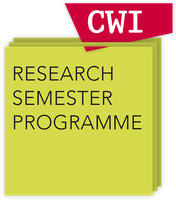
Research Semester Programme Machine Learning TheorySeminar++
- When
22-03-2023 from 15:00 to 17:00 - Where
L016, CWI
Overview
Seminar++ meetings consist of a one-hour lecture building up to an open problem, followed by an hour of brainstorming time. The meeting is intended for interested researchers including PhD students. These meetings are freely accessible without registration. Cookies and tea will be provided in the half-time break.
This lecture is part of a series of 8.

Hanyuang Hang
Assistant professor at the University of Twente.
Bagged k-Distance for Mode-Based Clustering Using the Probability of Localized Level Sets
Abstract: We propose an ensemble learning algorithm named bagged k-distance for mode-based clustering (BDMBC) by putting forward a new measurement called the probability of localized level sets (PLLS), which enables us to find all clusters for varying densities with a global threshold. On the theoretical side, we show that with a properly chosen number of nearest neighbors kD in the bagged k-distance, the sub-sample size s, the bagging rounds B, and the number of nearest neighbors kL for the localized level sets, BDMBC can achieve optimal convergence rates for mode estimation. It turns out that with a relatively small B, the sub-sample size s can be much smaller than the number of training data n at each bagging round, and the number of nearest neighbors kD can be reduced simultaneously. Moreover, we establish optimal convergence results for the level set estimation of the PLLS in terms of Hausdorff distance, which reveals that BDMBC can find localized level sets for varying densities and thus enjoys local adaptivity. On the practical side, we conduct numerical experiments to empirically verify the effectiveness of BDMBC for mode estimation and level set estimation, which demonstrates the promising accuracy and efficiency of our proposed algorithm.